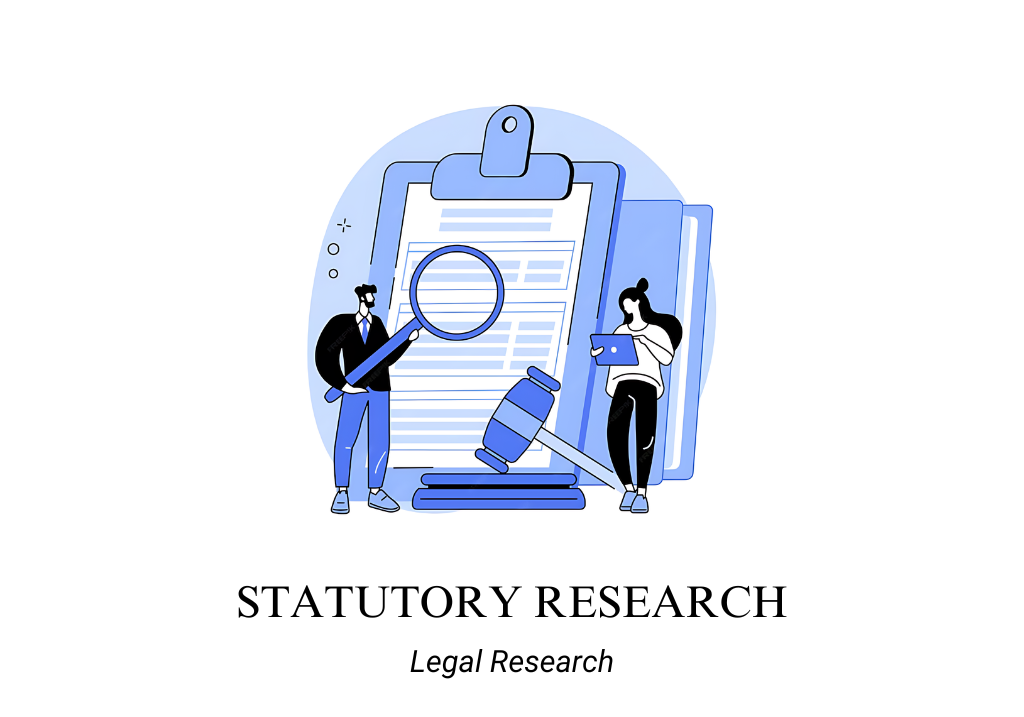Introduction
Meaning
Statutory research involves the systematic examination of statutes, regulations, and related legal materials to understand their application and impact in specific legal contexts. This functionality is essential for legal professionals who need to interpret and apply legislative texts to their cases or to advise clients accurately. Statutory research includes accessing comprehensive databases of statutes and regulations, understanding their historical context, and tracking updates to ensure compliance with current laws.
Purpose
The purpose of statutory research is to provide legal professionals with the tools and resources needed to thoroughly understand legislative frameworks and regulatory requirements. By efficiently accessing and analyzing statutes, regulations, and their accompanying annotations and updates, legal teams can ensure that their advice, strategies, and compliance efforts are grounded in current law. This functionality also supports the interpretation of complex legal texts and the anticipation of legislative changes that may impact clients or cases.
Benefits
- Comprehensive Legal Understanding: Enables legal professionals to fully grasp the scope and application of statutes and regulations, leading to more accurate legal advice and better strategic decision-making.
- Efficient Research Process: Streamlines the search for relevant legal materials, saving time and resources by providing access to comprehensive databases and tools.
- Up-to-Date Compliance: Ensures that legal teams are aware of the latest legislative changes and regulatory updates, minimizing the risk of non-compliance.
- Enhanced Legal Interpretation: Provides access to annotations, historical versions, and secondary sources that offer deeper insights into legislative intent and legal interpretation.
- Global Legal Awareness: Includes international treaties and conventions, broadening the scope of legal research to accommodate cross-border legal considerations.
CHECK MORE: Guide to find best Legal Research Tools
Features
Statutes and Regulations Databases
- Meaning: Statutes and regulations databases provide access to a comprehensive collection of legislative texts, including federal, state, and local statutes, as well as administrative regulations. These databases are organized to facilitate easy navigation and search, allowing users to quickly locate specific legal provisions relevant to their research.
- Purpose: The purpose of statutes and regulations databases is to ensure that legal professionals have immediate access to the full text of current laws and regulations. This feature helps users find applicable legal texts efficiently, enabling them to stay informed about the legal framework governing their cases or advising clients on regulatory compliance.
- Use Cases:
- Regulatory Compliance: A corporate legal team uses statutes and regulations databases to verify that their company’s operations comply with the latest state and federal regulations.
- Case Preparation: A lawyer preparing for litigation accesses statutes and regulations databases to identify relevant statutes that support their legal arguments.
Annotations and Historical Versions
- Meaning: Annotations and historical versions are features that provide additional context and interpretation for statutes and regulations, including notes on judicial interpretations, legislative history, and amendments over time. Historical versions allow users to see how a law has evolved, providing insights into legislative intent and changes in legal standards.
- Purpose: The purpose of annotations and historical versions is to enhance the understanding of legal texts by offering commentary, analysis, and a historical perspective. This feature helps legal professionals interpret statutes more accurately and understand the legislative intent behind current legal provisions.
- Use Cases:
- Legal Interpretation: A lawyer uses annotations to understand how courts have interpreted a particular statute, aiding in the development of legal arguments.
- Legislative History Research: An attorney examines historical versions of a regulation to track changes over time, helping to argue for a particular interpretation based on legislative intent.
Legislative Tracking and Updates
- Meaning: Legislative tracking and updates provide real-time monitoring of changes to statutes and regulations, including newly enacted laws, amendments, repeals, and proposed legislation. This feature keeps legal professionals informed about the latest legal developments that may affect their cases or clients.
- Purpose: The purpose of legislative tracking and updates is to ensure that legal professionals are always aware of the current legal landscape. This feature helps prevent reliance on outdated laws, ensures compliance with new regulations, and allows proactive adaptation to legal changes.
- Use Cases:
- Compliance Monitoring: A compliance officer uses legislative tracking tools to stay informed about new regulations affecting their industry, ensuring the company meets all legal requirements.
- Legal Practice Management: A law firm employs legislative updates to keep its attorneys informed about relevant legislative changes that could impact ongoing cases or require client advisories.
Secondary Sources
- Meaning: Secondary sources include a variety of legal commentaries, treatises, journals, law reviews, and practical guides that provide analysis, critique, and interpretation of primary legal materials such as statutes and case law. They offer in-depth perspectives and scholarly discussions on various legal topics, helping legal professionals gain a comprehensive understanding of complex issues.
- Purpose: The purpose of secondary sources is to provide additional insights and interpretations that go beyond the text of statutes and regulations. These materials help legal professionals understand broader legal principles, explore different viewpoints, and support their arguments with authoritative commentary.
- Use Cases:
- Legal Research and Writing: A lawyer writing a legal brief uses law review articles to support their arguments with scholarly analysis and criticism of relevant statutes.
- Continuing Legal Education: An attorney reads legal treatises and commentaries to stay current on evolving legal doctrines and enhance their professional knowledge.
Legal Treatises and Commentaries
- Meaning: Legal treatises and commentaries are comprehensive works written by legal experts that provide detailed analysis and explanations of specific areas of law. These resources offer in-depth coverage of legal principles, case law, statutes, and regulations, often including practical guidance and interpretation.
- Purpose: The purpose of legal treatises and commentaries is to serve as authoritative references for understanding and applying legal concepts. These sources provide valuable insights into complex legal issues, helping practitioners build strong arguments and develop a deeper understanding of the law.
- Use Cases:
- Complex Legal Issues: A lawyer facing a novel legal issue consults a treatise to gain a thorough understanding of the relevant legal principles and potential arguments.
- Case Strategy Development: An attorney uses a commentary to explore different interpretations of a statute, aiding in the formulation of a litigation strategy.
Journals and Law Reviews
- Meaning: Journals and law reviews are scholarly publications that provide articles, essays, and reviews on a wide range of legal topics. These publications often include cutting-edge legal theories, critiques of judicial decisions, and analyses of legislative developments, written by academics, practitioners, and judges.
- Purpose: The purpose of journals and law reviews is to offer in-depth scholarly analysis and discussion on various legal issues. They provide valuable perspectives that can inform legal arguments, support legal writing, and contribute to the development of legal theories.
- Use Cases:
- Scholarly Research: A legal scholar uses law reviews to conduct in-depth research on a specific legal topic, supporting their academic work with comprehensive analysis and diverse viewpoints.
- Argument Development: A lawyer references journal articles to bolster their arguments with cutting-edge legal theories and critiques.
International Treaties and Conventions
- Meaning: International treaties and conventions are agreements between countries that establish international legal standards and obligations. Legal research tools often include databases of these documents, enabling legal professionals to access and interpret international law as it applies to cross-border cases or multinational clients.
- Purpose: The purpose of including international treaties and conventions in statutory research is to provide access to the full text and interpretations of international agreements. This feature is crucial for cases involving international law, cross-border disputes, or clients operating in multiple jurisdictions.
- Use Cases:
- Cross-Border Litigation: A law firm representing a multinational corporation uses a database of international treaties to ensure compliance with international agreements relevant to their case.
- International Arbitration: An attorney involved in international arbitration consults conventions and treaties to support their arguments and understand the obligations of the parties involved.
Conclusion
These features within the statutory research functionality are essential for providing comprehensive, accurate, and current legal information. By leveraging these features, legal professionals can effectively research statutes, regulations, and secondary sources to build stronger cases, ensure compliance, and stay informed about ongoing legal developments.
CHECK OUT LEGAL RESEARCH TOOLS ON DIRECTORY OR CLICK HERE


